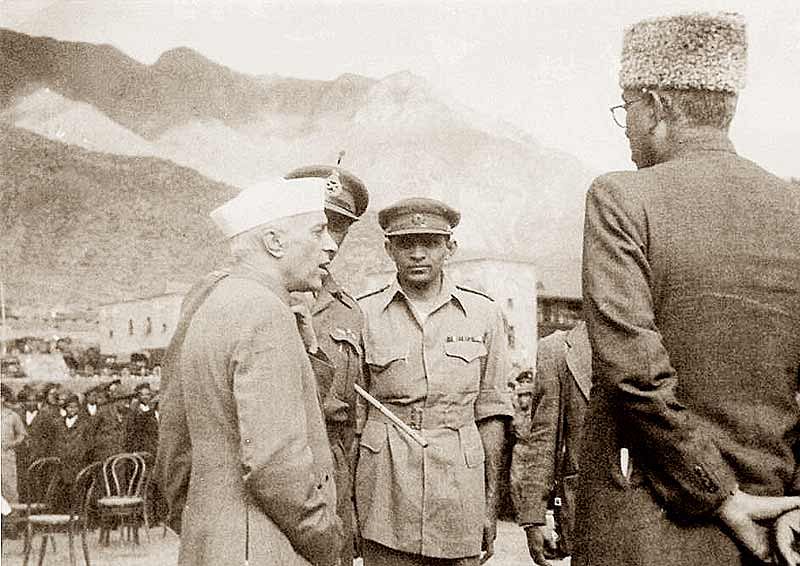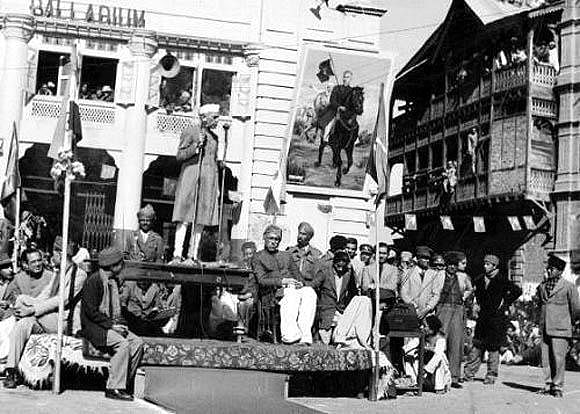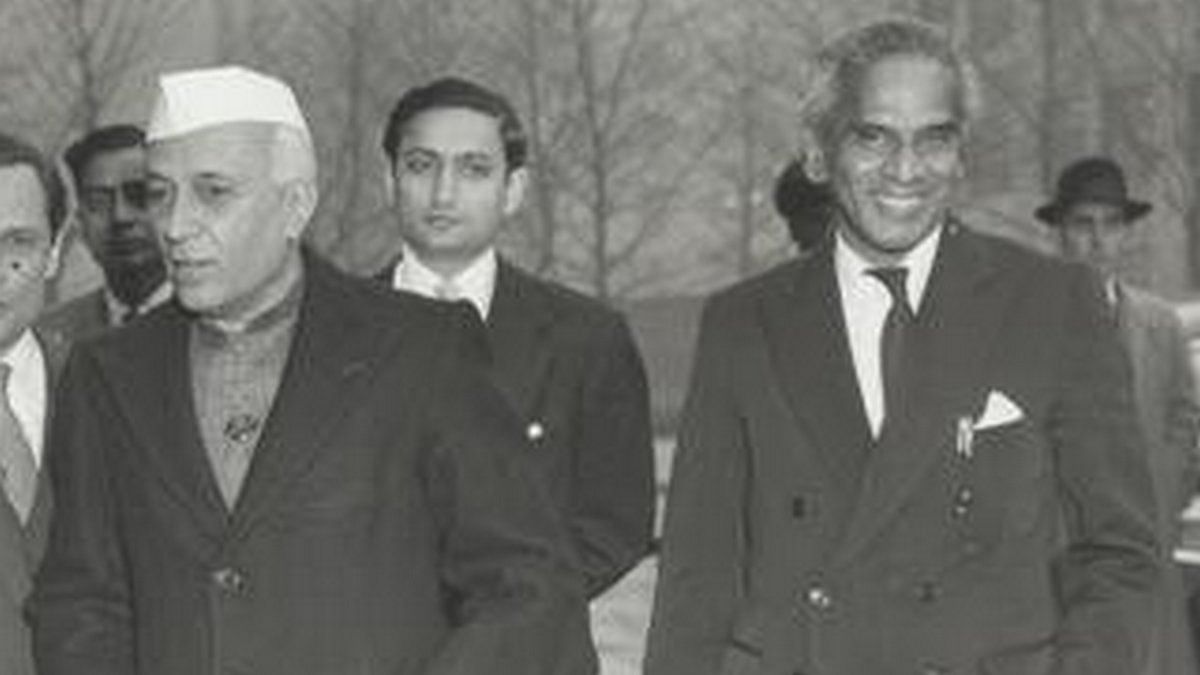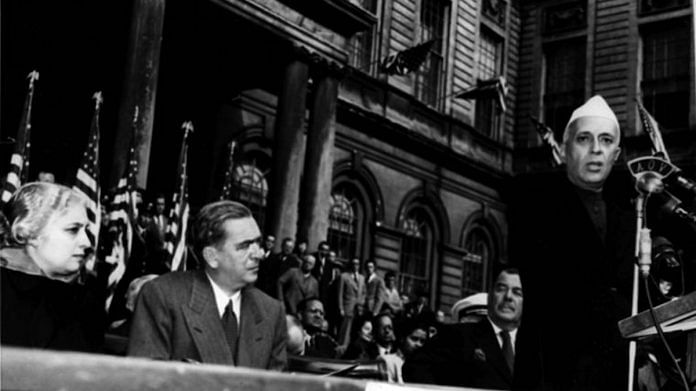The Kashmir question is complicated. What are the basic issues involved? There are many, but in my view the basic issue about Kashmir is the good of the people of Kashmir.
Nothing else counts. If it comes into conflict with other issues that count, then I, as the Prime Minister of India, necessarily have to take into consideration the interests of India. I have no business to relinquish or throw away the interests of India because of some sentiment. Nevertheless, I say that the major consideration for me and for my government has been the good of the people of Kashmir. Some people, chiefly in foreign countries, and sometimes even in India, refer to moral standards and say: “Mr. Nehru who pretends to be a high moral figure, doling out moral advice to everybody in the world, forgets his own morality when he deals with Kashmir; he has a double standard.” Well, it is very difficult for me to know my own failings, but I am not personally conscious of any double or separate standard. If I had deliberately judged Kashmir by any different standard, then indeed I would have stood condemned not only before other countries, but before my own people and above all before myself. I think that on moral issues India stands rather well over the Kashmir matter.
Look at the history of the case. Invasion through Pakistan and later by Pakistan; destruction, arson, loot, robbery, murder by people coming through and from Pakistan. This is the beginning of the story of the Kashmir issue, a story which goes back over nine years. It is also known that immediately after that, Kashmir acceded to India. According to us and many others it became our right and duty to protect Kashmir.
Quite apart from it, if we had not done this at that time, Kashmir would have been a smoking ruin and there would have been large-scale war between India and Pakistan. I know how troubled I was at that time. All our background had been one of non-violence and peace. Were we, immediately after independence, to be dragged into war?
What international commitments have we not honoured? If I am convinced that I have not honoured any international commitment, either I shall honour them or I shall resign my Prime Ministership of India and retire. Let others run India.
It was a terrible thing and yet there was Kashmir being looted, its people being murdered, there was arson and frantic appeals came to us from the people of Kashmir, apart from the Ruler. It was a very difficult decision to take. Fortunately we had Gandhiji with us at that time. I am not using Gandhiji’s name to entangle him in this matter. I do so merely to tell you that as usual I ran to him for some advice and light. I believe he also spoke publicly about this matter. He told us it was our duty to go to the help of the people of Kashmir. He, a man of peace, told us so. We went to Kashmir and we found that it was not an attack by mere raiders only, but that the Pakistan Army had entered Kashmir. We found we had undertaken something big. The normal consequence of this would have been war with Pakistan. They had come in and had committed aggression. Whatever argument one may use about the State’s accession to India or about India’s right to have troops in Kashmir, there is absolutely no argument, even a flimsy one, to justify Pakistan’s action in sending troops there. There is no doubt from any point of view that it was aggression by Pakistan and we were entitled in law and fact to attack Pakistan all over. We were much stronger than Pakistan militarily. But we did not attack them. It was to avoid war with Pakistan that we went to the Security Council.

Also read: Nehru going to UN on Kashmir was an error. And he knew it
Plebiscite on certain conditions
Even there we expressed ourselves moderately, in asking Pakistan not to encourage aggression over India. Never in these nine years have we had an answer to this question. The Security Council and their Commissions did say this and have said clearly that Pakistan had in a sense committed aggression. They admitted the right of India and the government of Jammu and Kashmir to sovereignty over the territory of Kashmir, even over the territory which Pakistan is occupying.
All these are on record. But they said that it was more important for us to come to an understanding than for them to condemn anybody. We agreed, but we said: “Pakistan has done us grievous wrong, but we do not want to condemn Pakistan because we want to live in peace with Pakistan; we want to be friends and we are neighbours.” So time and again we have moderated our policy. We did not put forward the principal facts with all the vigour that we could have commanded. We talked about many other matters. Then we agreed to a plebiscite on certain conditions, in a certain context of events.
The very first condition was the withdrawal of the Pakistan Army from the territory of Jammu and Kashmir State. There were many other conditions; but that was the first because the aggression had to be purged before we could take any other step. That was the principal proposal in the UN resolution which dealt ultimately with the plebiscite and many things else. First, there was to be a ceasefire, then a truce; then other measures and then plebiscite. But immediately after the ceasefire, as part of the truce, Pakistan’s armies had to withdraw from the territory they had invaded.
There is no doubt from any point of view that it was aggression by Pakistan and we were entitled in law and fact to attack Pakistan all over. We were much stronger than Pakistan militarily. But we did not attack them.
They have not done that to this day. I am told today that India comes in the way of a plebiscite, that we have not fulfilled or honoured our international commitments. If Pakistan says so, I can understand it, because Pakistan is in the habit of making entirely irresponsible and even untrue statements. But it surprises me and pains when others say so.
What international commitments have we not honoured? If I am convinced that I have not honoured any international commitment, either I shall honour them or I shall resign my Prime Ministership of India and retire. Let others run India.
During all this period we have discussed these matters with Pakistan. Sometimes they have made suggestions, we have made offers and they have made counter-offers and this question of plebiscite has been discussed as also the question of conditions relating to it. All this has been in the nature of discussions as to how to solve the problem. Once or twice some steps were agreed to, but the steps were not implemented by Pakistan. In such circumstances any offer would be in the nature of a conditional offer. First of all, the offer was strictly conditional. Secondly, it could not last for ever and ever. Conditions change and in these nine years conditions have changed very greatly.

For three years we waited and then we said: “Wy are not like Pakistan to carry on without Constitution or without elections.” The Jammu and Kashmir people had a Constituent Assembly to frame a Constitution and held elections for that Assembly. After five or six years’ deliberations, they have framed a Constitution for the State. The question of accession of Kashmir to India was really decided in 1947. So far as the Constitution is concerned, it has confirmed the accession. Even this confirmation was done a few months ago. Therefore nothing startling was going to happen on January 26 this year, and yet there was tremendous noise that something new was going to happen on that date and a resolution was hustled through the Security Council, even without an attempt to understand what exactly would happen on January 26. As you all know, the resolution which the Council passed had been drafted and was in existence even before they bothered to hear our representative. That is what I call a casual way of dealing with an important question.
Also read: How, on this day 72 years ago, Jammu & Kashmir agreed to become a part of India
US supplying arms to Pakistan
After drafting the Constitution of Jammu and Kashmir, the Constituent Assembly has ceased to exist. Just as we are holding our national elections, they are going to hold elections in Jammu and Kashmir. You will see that we have thus made great advance, not in the old sense of plebiscite, but in getting people to elect their representatives. The new elections in the State will be held in a month or two, and I am confident they will be fair and impartial. The Prime Minister of the Jammu and Kashmir government has invited foreign journalists and our own pressmen to see the elections for themselves. Last year 70,000 tourists visited Kashmir. There is no iron curtain or any other curtain there. You can also go there, any of you, and see for yourselves.
But what has happened on the other side? The area of Kashmir which is occupied by Pakistan has had no election. In fact, look at Pakistan itself. They have had no true election there for nine years, ever since they got Pakistan. They talk loudly about plebiscites elsewhere. But in their own country they have not been able to have true elections all these nine years. After very great effort they prepared a Constitution some months ago, but no elections have yet been held. Note that Azad Kashmir, that poor area, has had no chance of elections and it has been incorporated into Pakistan. That is another interesting thing for you to remember. There has been all this great fuss about the Jammu and Kashmir government framing its Constitution, in which it reiterates a fact that has been there all along, namely, accession to India. But when the Pakistan Constitution incorporated that part of Jammu and Kashmir which is in their possession nobody shouted. The Security Council did nothing at the time.
Every day I read in Pakistan papers exhortations to the effect: “Let us have war now that we are strong.” They have heavy armour. They have plenty of the latest types of aeroplanes. And they live on a fare of hatred and violence. Naturally this causes us concern. I do not want you to reply in kind.
All I can say is, the Council has not applied its mind to this question. It is extraordinary for people to say that we have come in the way of plebiscite. No plebiscite could be held because none of the conditions was fulfilled. The plebiscite was to cover both sides. We got stuck even on the preliminary condition of withdrawal of forces. The Pakistan forces had to go root and branch before further steps could be taken.
Meanwhile, a new development took place—the supply of arms to Pakistan in considerable quantities from the United States of America. The United States has every right to supply arms to Pakistan, and Pakistan, I suppose, has every right to take them. They are independent countries and I have no right to object. But that supply of arms made a great difference to the situation in Kashmir. We told this to the Pakistan government and other governments. But we were told—I can believe their word that these arms were not to be used against India and that they were intended to be used against aggression. I accept that. But how can even the great US government check their use? Every day I read in Pakistan papers exhortations to the effect: “Let us have war now that we are strong.” They have heavy armour. They have plenty of the latest types of aeroplanes. And they live on a fare of hatred and violence. Naturally this causes us concern. I do not want you to reply in kind. I do not want our students to do what the students in Pakistan did or are doing. As a responsible government, we have to take all these factors into consideration. They have built airfields in Gilgit, Muzaffarabad and other places, which is completely against the ceasefire arrangement or resolutions of the UN Council. Gilgit is in the heart of the Central Asian mountains.

The mere fact that all these big airfields have been built, apart from anything else, is a serious matter. Nobody talks about these things because we have taken up as accommodating an attitude as possible. All our virtue in accommodation is forgotten. They try to bind us down to it. They tell us not to go into the past or into the question of aggression, but only to talk about the plebiscite to which they tell us we agreed. Even the conditions governing the plebiscite are forgotten. I say that this is most extraordinary. The welfare of vast numbers of human beings of Kashmir is involved and I do not want any final decision which is against the interests of Kashmir people. I do not want to ask for a decision on a legal issue. But when I am charged with dishonourable practices, when the charge is made by Pakistan and, to some extent, by other countries that I have abrogated my commitments, I have a right to state what the legal position is. I am not overstressing it, but merely stating it. I have a right to demand a decision on this basic issue of aggression, because it might recur at any time.
Also read: India lost independence once. Can Constitution prevent another loss, Ambedkar asked
Pakistan for hate, India for friendship
We have to look at the practical and factual aspect. Krishna Menon spoke for nine hours. But there was no reference in the subsequent speeches made by others to the points Krishna Menon had raised. The Council has merely passed a resolution as if nothing has been said on our behalf.
This is strange. What should concern us and the Security Council and the world is that nothing should be done in Jammu and Kashmir State which, instead of solving the problem, creates greater problems. Nothing should be done which upsets things. Nothing should be done which might bring before us the horrors of August, September and October 1947. That is the governing consideration in our minds.
Every step we have taken has been guided by that thought. Take even this question of plebiscite. From the first day we have been telling the UN Commission and Pakistan: “If the conditions we lay down are satisfied and if there is complete peace and order, we are prepared to have a plebiscite.” I tell you in all honesty, that under fair and peaceful conditions, and conditions wherein religious fanaticism is not allowed play, I have no doubt that a great number of people of Kashmir in a plebiscite would vote for India. We have laid stress always that this election or plebiscite must be on political issues and on economic issues. We do not want communal riots in the State and call them a plebiscite. We do not want a raging campaign based on religious bigotry. We do not want passions to be roused. This question of Kashmir, therefore, becomes one of deep significance in that any wrong step taken will upset many things in the whole of India and in the whole of Pakistan.
Unfortunately, Pakistan’s mind is tied up in this way with violence and hatred against India. I hope the people of Pakistan will get over it. At any rate we are not going to reply in kind. We will continue to be friendly with them.
We have never accepted and we do not propose to accept the two-nation theory on which Pakistan was founded. Remember that when in the days before Partition, the Muslim League in India flaunted this theory, the Kashmir people rejected it, because Kashmir has been throughout history a place of very little communal tension. Hindus, Muslims and Buddhists have lived together in amity in Kashmir, whether the ruler has been Muslim or Hindu. Their religions might be different but their accomplishments and customs are similar. They live together and they meet together. Even when India was at the height of communal frenzy, in August 1947, Kashmir was calm. I do not want Kashmir, in the name of plebiscite, to be now made the scene of a fratricidal war. Such a war will spread to other parts of India and upset the delicate balances that have been established. It is a matter, therefore, of the utmost concern and consequence to us that no step is taken in Kashmir which will have these tremendous reactions, like refugees streaming into Pakistan and refugees streaming into India and so on.
Such a solution would be no solution of the Indo-Pakistan problem, but a worsening of the situation. Judging simply from the point of view of consequences, we must realise that no responsible person or authority can think of a step which will create these grave upsets in the lives of India and Pakistan and which will probably ruin Kashmir.
Pakistan talks about a plebiscite. It would be becoming to have its own elections before talking about election in Kashmir. Pakistan has called in many countries in support. Many of them are its allies. We do not approve of military alliances like the Baghdad Pact because they have caused a great deal of uncertainty. It is possible that these military alliances account for the strange resolutions that have been passed in regard to Kashmir. Some, at least of the countries of the Baghdad Pact, indeed many, are supposed to belong to the Free World. I venture to ask, in all respect, whether they have elections. Do they have a free press? Do they have the right of free assembly? It is the “free world” which calls for elections and plebiscite when these countries have themselves no election and have authoritarian systems of government. It is a strange world, my friends. It pains me that countries which are friends of ours because we are friendly with all countries should have considered this question in so casual a way. I hope that they will give more thought to it in the future. It pains me that all this hatred and passion are roused in Pakistan. It is not good for us, of course; but it is much worse for Pakistan. All our minds are concentrated on building up our country and implementing our Second Five-Year Plan. We do not want it diverted to other matters. If I can help it, I would not take part in any international dispute or issue: but I cannot help it when issues concerning us come up. Unfortunately, Pakistan’s mind is tied up in this way with violence and hatred against India. I hope the people of Pakistan will get over it. At any rate we are not going to reply in kind. We will continue to be friendly with them. Only the other day, while all this was happening, we signed a trade pact in which we went as far as we could to oblige Pakistan.
We shall continue this policy because we consider it basically the right policy.
I told you at the beginning that we need not develop cold feet about these matters. Getting excited helps us at no time, much less in a serious situation, when we have to keep our minds right. The best way for us is to work and strengthen the country through the Five-Year Plans. That is what you should remember at the forthcoming elections. Answer the challenge in the way that I have suggested to you. That is the proper way.
This is part of ThePrint’s Great Speeches series. It features speeches and debates that shaped modern India.



